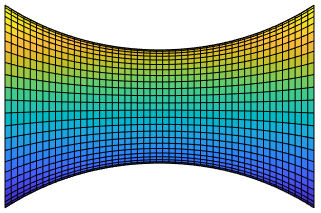Introduction
 Calculus is a beautiful mathematical subject with striking applications in science and engineering. In Calculus I, you learned about the main objects in calculus: the derivative and the integral. In this class, we will study their use in mathematics and applications. Broadly speaking, you will learn to integrate complicated functions, use integration techniques to solve differential equations stemming from physical systems, use sequences and series to compute or approximate functions, and study geometric objects using tools from calculus.
Calculus is a beautiful mathematical subject with striking applications in science and engineering. In Calculus I, you learned about the main objects in calculus: the derivative and the integral. In this class, we will study their use in mathematics and applications. Broadly speaking, you will learn to integrate complicated functions, use integration techniques to solve differential equations stemming from physical systems, use sequences and series to compute or approximate functions, and study geometric objects using tools from calculus.
The material covered will be drawn from the following: Techniques of integration, including integration by parts, simple trig substitutions, partial fractions. Basic numerical integration; improper integrals; arc length; area of surface of revolution. Separable differential equations, Euler's method, exponential growth and decay. Parametric curves and polar coordinates. Review of conic sections. Sequences and series, comparison and ratio tests, Taylor series and polynomials. Vectors in three dimensions, dot product, cross product, lines, planes, cylinders, quadric surfaces; cylindrical and spherical coordinates.
Course Information (pdf version)
| Instructor | Jeff Calder (Office: 538 Vincent Hall) |
| Prerequisites | MATH 1271 or equivalent with grade at least C-. |
| Moodle Site | https://ay17.moodle.umn.edu/course/view.php?id=18654 |
| Lectures | (40) Mon, Wed, Fri 3:35pm--4:25pm in Rapson Hall 100 |
| Discussion | (41) Jodin Morey: Tue, Thurs 3:35pm--4:25pm in Lind Hall 229 (website) (43) Jodin Morey: Tue, Thurs 4:40pm--5:30pm in Lind Hall 217 (website) (42) Gregory Michel: Tue, Thurs 3:35pm--4:25pm in Tate Hall B85 (website) (44) Wuzhe Xu: Tue, Thurs 4:40pm--5:30pm in Vincent Hall 113 |
| Office Hours | Jeff Calder Math Lab (314 Vincent): Mon 11am--12pm Office (538 Vincent): Wed 12pm--1pm and Fri 1:30--2:30pm Jodin Morey Math Lab (314 Vincent): Wed 1pm--3pm Office (505 Vincent): Fri 1pm--3pm Gregory Michel Math Lab (314 Vincent): Thurs 11:15am--12:15pm Office (524 Vincent): Tue 11:15am--12:15pm Wuzhe Xu Math Lab (314 Vincent): Mon 4pm--5pm Office (420 Vincent): 4:30pm--5:30pm Students are free to attend any of the office hours above. |
| Textbook | Stewart, Calculus: Early Transcendentals, volume 1, 8th edition, chapters 7-12. NOTE: While there is some overlap between the 7th and 8th editions, the problem sets differ substantially, and students are strongly discouraged from using the 7th edition. In particular, TAs will not be responsible for discussing problems from this edition. |
| Homework | A list of suggested problems is given on the homework page. Homework will not be collected and will not be graded. Quiz and exam problems will be similar to the suggested problems. Working out many exercises is essential for success in the course. |
| Assessment | The final grade is broken into three components:
The final grade distribution for each discussion in all lectures of MATH 1272 will be determined by its students' performance on the common final exam. An individual student’s final grade within that distribution depends on all of the work of the course, including the work graded individually by that discussion's TA. By University policy, a grade of A represents achievement that is outstanding relative to the level necessary to meet course requirements. A grade of B represents achievement that is significantly above the level necessary to meet course requirements. A grade of C represents achievement that meets the course requirements in every respect. A grade of D represents achievement that is worthy of credit even though it fails to meet fully the course requirements. Extra credit is not intended to be part of this course. |
| Missed Exam Policy | Missing an exam is permitted only for very serious and unavoidable extenuating circumstances, and only if you notify the instructor (not your TA) in advance. In all cases of absence from exams a written excuse is required. Otherwise you will get a score of 0 on the exam. If you are excused from a midterm exam, your final grade will be computed by either placing extra weight on the other midterms, or on the final exam, whichever results in a higher grade. Except in truly exceptional situations, a student who misses the final exam will fail the course. There will be no makeups for missed quizzes. |
| Explaining Answers | The ability to successfully explain why something is true is fundamental in mathematics in general, and very important in this class. You will be expected to explain the logic that led to your solutions on quizzes, midterms, and the final exam. This is a necessary component to a correct answer and solutions without sufficient explanation will lose points. |
| Calculator Policy | No calculators of any kind will be allowed during quizzes, midterms, and the final exam. This includes cell-phones and internet-connected devices. Quiz, midterm, and exam problems will be written so that calculators are unnecessary. | Policy statements | Policy statements on grade definitions, scholastic dishonesty, student conduct, sexual harassment, equity, diversity, equal employment, affirmative action, mental health and stress management services, and academic freedom and responsibility are available via links in part B of this document If you have a letter detailing accommodations, notify the lecturer and your TA as soon as possible. | Student learning outcomes | A student in MATH 1272, as in any mathematics course, will
develop the following skills, identified in the University’s Student Learning Outcomes:
|